#Institut Iliade
Explore tagged Tumblr posts
Text
sometimes the oversimplified queer readings of classic texts by gen Z gays frustrate me so much because you know they are not actually looking to make meaningful literary discourse at all. some of the essays and meta I read by students and lit enthusiasts here are really good, but most of them are just like "haha ophelia is hamlet's beard and getting cuckolded 🤪🤪🤪" or "omg this female character is a LESBIAN because she shows dissatisfaction with the oppressive Victorian institution of marriage!!" the worst of this has happened to Greek classic texts and Greek mythology/history in general, esp The Iliad: aka The Madeline Miller syndrome of thinking you're revolutionizing literature by saying "achilles was kind of a bisexual icon!" without reflecting AT ALL on Homeric misogyny and how it affected the portrayal of his female characters, including Helen, Briseis and- yes. yes! - the goddess Hera. Everything needs to be made Gay™ not in a way of queer art or nuanced discussions of gender and sexuality, not in the way, say, Carmen Maria Machado reads Carmilla or Kalynn Bayron reads Jekyll and Hyde, but in a uwu quirky-banter-found-family nauseatingly YA manner.
11K notes
·
View notes
Text

Behold: a low quality picture of my notes.
10|01|2025
In the past couple of days I started reviewing for my history of political and social institutions exam as well. Both tomorrow and Monday will be fully dedicate to my last review for my history of Sabaudian states exam, for which so far I am the only person who has signed up. That is going to be an experience™ if I end up being the only student there. It's kind of fucking up with my anxiety and stess levels, I won't lie. In fact I have been having terrible sleep and many nightmares, which isn't ideal. Hopefully in the next couple of days I can get some rest and grow a bit more confident. I cannot wait for exam season to be over. I also emailed a professor to let her know that despite what I had previosly told her I will not be taking her exam this season, instead I will take that in April. I had ment to email her for a few weeks now, but I also didn't want to sent her emails during the holiday break.
📖: Iliad by Homer
#i am veey tired mentally#i cannot wait for this to be over#studyblr#studyinspo#uniblr#university#journal#studying#productivity#journaling#knife gang#mine#the---hermit
37 notes
·
View notes
Text
🦉Athena Masterpost: Domains🦉

🐍 Masterpost Link 🐍
Last updated: Date of Publishing

Athena, Goddess of…
Metis
As a concept, metis could be translated and understood as meaning “practical wisdom”, “cunning”, “prudence”, “craftiness’ or “skill,” but it is often simply translated into “wisdom.” To many, this word conjures up the image of an old sage, a scholar surrounded by books and full of knowledge. But this was not how metis was conceptualized in ancient Greek culture.
Metis is “a complex but very coherent body of mental attributes and intellectual behaviour which combine flair, wisdom, forethought, subtlety of mind, deception, resourcefulness, vigilance, opportunism, various skills, and experience acquired over the years." It is an intelligence which is often associated with trickery and deception, adaptability, improvisation, shifting movement, shape-changing, quick thinking and seizing the opportunities at the right moment (kairos). Metis is more focused on getting practical results and success within an activity, not theoretical knowledge, and could be applied to many areas of life: "It may involve multiple skills useful in life, the mastery of the artisan in his craft, magic tricks, the use of philtres and herbs, the cunning strategems of war, frauds, deceits, resourcefulness of every kind."
Metis is also not limited to humans, but also applied to animals, such as foxes, fish and octopuses - animals with ‘cunning tricks’ (dolos) and deceptions that allow them to catch their prey or evade their predators. "The world of duplicity is also a world of vigilance: both the fishing frog squatting in the mud and the octopus plastered to its rock are on the alert; they keep a look out, are on the watch for the moment to act. Every animal with metis is a living eye which never closes or even blinks."
This was the kind of cunning we would associate today with the trickster archetype, not the book-loving sage. Athena was not the only deity to have metis (for example, Zeus is another major one) but this concept is a core part of who she is and influences her other associations and her connections with other deities.
Sources:
“Cunning Intelligence in Greek Culture and Society” - Marcel Detienne, Jean-Pierre Vernant
“Athena” - Susan Deacy
🐍Excerpts from “Cunning Intelligence in Greek Culture and Society”
Skill: Related to metis in that it’s very practical, with some intuitive sense but also dependent on experience and practice. This can be applied to many areas of life, though in Athena’s case it was often in relation to war, crafts, sailing and invention.
Crafts: Mainly associated with weaving, Athena was also worshiped in the festival of bronze smiths and artisans, Khalkeia. This aspect is very closely related to skill - as the word for both is ‘tekhne’ (τέχνη). This word is also one related to metis and associated words.
Invention: Athena is known as an inventor, with particular inventions being the bridle, plough and aulos. This aspect is also related to metis, craft and skill.
War: Although typically associated with the skills of war, and strategy, Athena was also associated with war in the same way that Ares was - she was ‘dreadful’ Athene “concerned with works of war, the sack of cities and the shouting and the battle.” (Homeric Hymn 11 to Athena)
🐍On the comparison of Athena and Ares
🐍Iliad - Athena dons the Aegis
Civilization, Politics & Justice: Athena in cult was often paired with Zeus, and these two presided over a number of civic institutions, for example the boule (a council that ran the daily affairs of the city) was watched over by Athena Boulaia and Zeus Boulaios. Athena was closely tied to the Athenian state and in myth was also heavily involved in the first criminal trial - that of Orestes.
Hero Mentorship: Athena was often involved in guiding, aiding and mentoring heroes such as Diomedes, Odysseus, Telemakhus, Herakles, Bellerophon and Perseus.
🐍Athena and Herakles Wedding Imagery
Education and Knowledge [SPG]: Athena’s modern associations with education and intelligence come from how she was adapted in post classical times as an allegorical symbol for church-approved virtues of wisdom and justice. The Renaissance furthered this connection, as she became a symbol of the arts, education, science, human excellence, and liberty.
Information Technology [UPG]: My personal UPG, based in part on Athena's associations with invention, civilization and knowledge, and in part on my own understanding of her character and my relationship and practice with her.

#Athena Masterpost#athena#Athena deity#Athena goddess#athena devotion#athena worship#helpol#hellenic polytheism#hellenic pagan#paganblr#hellenic polytheist
30 notes
·
View notes
Text
books & stuff!!
i have been meaning to make this post for months now lol oops :') have been asked to recommend books and stuff so here i am finally, i will update with more as i go along and link what i can find. enjoy!
--
Islam
made a list of reads and resources for sisters looking into islam on reddit, indeed this blog was first made with the purpose of sharing things abt islam & muslim daily life & med stuff. so by popular request (a beloved moot lol) i present to u
*:・゚✧ links to playlists:
5 pillars made plain (a playlist going through the foundation upon which Islam is built. Islam 101 if you will)
My moment of conviction (when reverts realised they were on the right path)
Jesus in Islam (learn how Muslims see Isa peace be upon him)
Keys to prophetic parenting (parenting from the perspective of the best of mankind!)
*:・゚✧ resources in general:
Quran.com (listen to the Quran, read the tafsir (exegesis), and peruse reflections left by users)
Sunnah.com (books of Hadith (narrations of the prophet peace be upon him) categorised according to authenticity, the best of which belonging to Sahih Muslim and Sahih Bukhari may God be pleased with them both)
and:
Yaqeen institute (website & youtube)
Mufti Menk (scholar and speaker, passionate, sometimes funny, always informative) & my favourite dad joke of his lol
*:・゚✧ books i have:
Islam for younger people (i reread this often ^-^)
Islam beliefs and teachings (this ones in my dads office lol)
answers to non muslims' common questions about islam (direct and satisfactory)
in the early hours (a book gifted to me and is dear to my heart)
islamic manners (another gift, a must read for everyone really)
God bless! *throws sparkles*
--
my library
sadly i am not as well read as i would like to be lol, my lil library is limited to the books i grew up with; a few older children novels and some non-fiction. i mainly want to read classics, literature and poetry alike, like shakespeare, the bronte sisters, jane austen, edgar allan poe and the like. ive been meaning to expand for years, but alas, i have yet to find the time (and motivation) to do so. not really into ya, id love to read crime and mystery though (like agatha christie) one day. wow just remembered my sherlock holmes phase while writing this :D
*:・゚✧ currently reading (and i use the term reading very loosely lol):
the posthumous memoirs of bras cubas (download link)
the iliad - homer
the odyssey - also homer
probably more i forgor
*:・゚✧ on my shelf (physical and metaphorical):
the black death - philip ziegler
hagakure - yamamoto tsunetomo
the ones who walk away from omelas (rec from a moot :3)
as long as the lemon trees grow - zoulfa katouh
there will come soft rains - ray bradbury
*:・゚✧ favourite & most beloved reads:
the anne series (esp anne of the island)
children of the new forest
the secret garden
companions of the prophet (comfort reads of mine. also i have the revised edition and i only found my book 2, heres a pdf tho)
*:・゚✧ others:
toxic childhood - sue palmer (was reading parenting books at 15 lol. tbf its a great read. i also had no friends so)
theres a sequel too (detoxing childhood)
a short history of the ottoman empire - erhan afyoncu (this is the only link i found beside amazon :'))
living in the ottoman lands: identities, administration & warfare (turkiye was beautiful & i still feel guilty abt not reading these two)
probably more i also forgor
--
thank u for reading this far and being patient with me i really appreciate it lol. happy reading!!
for my beloveds @notsolonedesert & @sporadicallyanenthusiast <3
#no im not procrastinating what makes u say that#God bless the internet archive. may its shadow never grow less#books#recs#hallelujah#i have achieved only this since the morning#and had lunch#NOT PROOFREAD#feel free to recommend yalls faves :D
49 notes
·
View notes
Text
Excuse me I’m having a bit of a moment
When I started making my little comics it was for fun and for my classes and I had no life so I had all the time in the world to fall down endless rabbitholes of research and even do my own translations and make entire pages of panels in one night.
Now it’s ten years later and I have no time because I have a kid and a DIY project with a mortgage attached and a husband I actually want to spend time with and I ache everywhere and am so damn tired and I can barely find time or inclination in the week for a single panel because the research takes about a week and even then it’s not enough
And I wonder why I bother because now I’ve found you here, all you amazing artists who make absolutely beautiful mythology art and my diddy little explanatory comics for my classes with black and white stickmen look like what they are, a bit crap really, and who even sees them, and what does my work matter and why am I even bothering with my You Are Odysseus project when there are so many other worthy projects I could be doing and should be doing and who wants to hear from me anyway
So here’s me trying to make myself feel like I matter:
- 18 years of teaching Classical Civilisation, building my knowledge and reputation
- 11 and 15 years respectively teaching the Iliad and Odyssey
- 200+ schools and homeschoolers helped to take on or teach the Classical Covilisation GCSE in Classical Civilisation with lesson resources I made available
- 4 years of ClassicsTober prompts (JOY!)
- two awards from institutions I deeply respect
- so many comments on my YouTube videos that are variations on the same theme: ‘you made me understand’
✨- and I just noticed there are over 1 million pageviews on greekmythcomix.com✨
- and I do still actually enjoy making my silly little comics because creating and teaching make me feel ALIVE
Never stop creating what you love. What is the point in existing if we do?
#imposter syndrome#greek mythology#tagamemnon#greek myth#illustration#odyssey#odysseus#greek myth comix#homer#comix#gcse classical civilisation#one million views dammit#having a moment#Felt impostery might delete later.
42 notes
·
View notes
Text
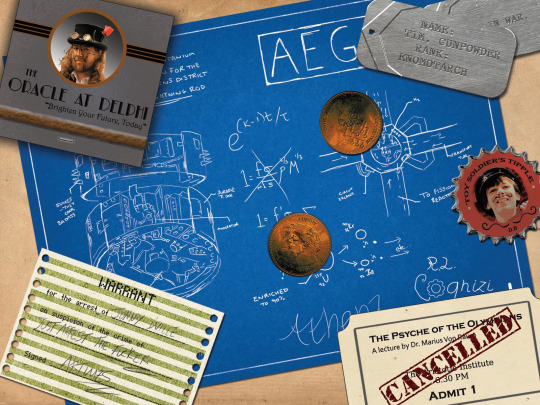
ALRIGHT. LET’S INVESTIGATE THE UDAD PHOTOS. MUCH INFORMATION BELOW. SO MUCH
ok top left. brian is the oracle of delphi, of course in greek mythology the most prominent oracle
bottom left. for some reason the goddess artemis’ name seems to have been misspelled as artimes? I have no idea why. artemis is the olympian that features in actea and lyssa.
bottom right. seems to suggest marius’ lecture will take place in the aristotle institute - aristotle is a famous greek philosopher (among other things, grouped loosely as a polymath)
top right. as you likely know, these are military dog tags, usually intended to allow for the identification of corpses. an enomotarch is the commander of an enotomy, a division of 25-36 soldiers, bound together by oath. this seems to be a term originating in Sparta.
middle right. tipple seems to be a term for alcohol, consistent with the bottle top the term appears on. the toy soldier seems to have made its own liquor brand while in the city. (perhaps DB stands for dionysus bacchus, the greek and roman names respectively for the god of alcohol?)
right. a coin is shown, on one side reading ‘to speed the/journey down’. this likely is about the belief that the ferryman (charon) who takes the dead souls across the river acheron and into the underworld must be paid. virgil’s aeneid claims that if the deceased cannot afford to pay the ferryman, they must wander the shores of the styx (another underworld river, in some stories providing the same function as the acheron) for one hundred years before they are allowed to cross into the underworld. thus having this coin to give the ferryman would literally speed the journey down into the underworld in greek mythology. also depicted on this side is the logo of the acheron. on the other side of the coin is featured a headshot of ashes, with the text ‘a penny’ above (the smallest british unit of currency). I cannot discern the text below.
background. the blueprint for the aegis, which in homer’s iliad is a device carried by athena pr zeus, interpreted as either an animal skin or a shield, sometimes featuring the head of a gorgon, that symbolises protection.
the text on the left appears to read as follows:
‘…[ti]tanium…n for the…ens district…[lig]htning rod
‘spikes - they look badass
‘Durable Ti core
‘Moderator’
Ti is the chemical symbol for titanium. also depicted is a uranium fission reaction. a moderator is something else that is needed in a fission reactor core, so this must be a design for a fission reactor. ‘enriched to 90%’ refers to the uranium - uranium-235 is the most fissile isotope, so the more U-235 you have, the more fission you can achieve. for context, reactors often use uranium enriched to 3.5-4.5% - 90% is overkill by a long way for energy generation purposes. my guess is that this reactor core is designed to provide huge amounts of energy to operate sone kind of lightning device, likely intended for zeus (the god of lightning). it is signed by athena and raphaella la cognizi.
BRING FORTH THE NEXT IMAGE!

another acheron coin is shown. I'm not really sure what’s happening in most of this one.
ANOTHER!
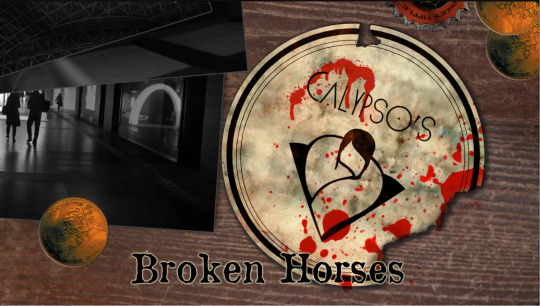
more acheron coins and a half-visible toy soldier’s tipple bottle cap. the focus of this picture is a torn and blood-splattered coaster for Calypso’s, the bar from which the suits kidnapped ulysses.
NEXT!
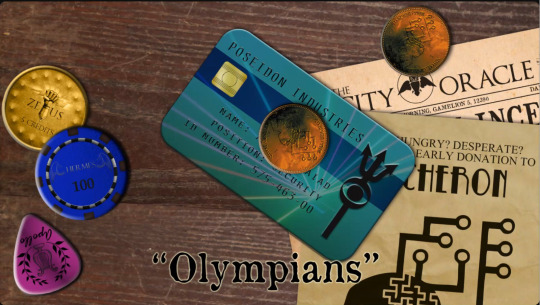
now this is more like it
a zeus coin is depicted, showing five credits - presumably the official currency of the city
there is a gambling chip bearing the name hermes, perhaps referencing his role as a trickster god
the guitar pick is stamped with the name apollo, the greek god of music and song.
there is a fragment of a newspaper cover - we will get more shots of this later.
the emblem of poseidon is shown to be a trident, a weapon poseidon is often depicted as wielding, representing his status as god of the sea.
wow I wonder what name is on that card it’s mostly blocked I wonder if the next will have the name..
BEHOLD!
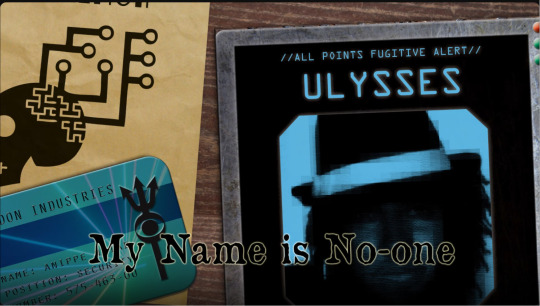
so that’s presumably an ID card for a security guard, whose name we can now see is Anippe ?aiad. Anippe in greek mythology is the egyptian daughter of the river god nilus, and is thus a naiad, so the name on the card is Anippe Naiad. I can find little information about her, other than that heracles killed her son.
we also get a look at ulysses here, the the text ‘//ALL POINTS FUGITIVE ALERT//‘ above their mugshot.
NEXT!
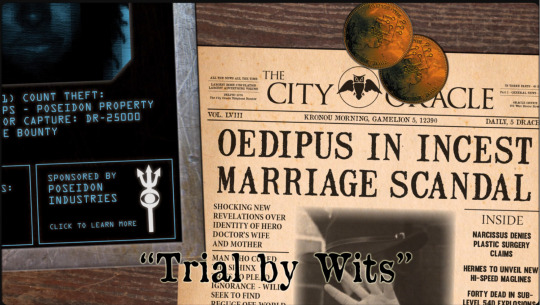
the text on the ulysses info that seems to be on some kind of old tablet reads
…1) COUNT THEFT:
…[CYCLO]PS - POSEIDON PROPERTY
…OR CAPTURE: DR-25000
…E BOUNTY
…S:
SPONSORED BY POSEIDON INDUSTRIES
CLICK TO LEARN MORE
this seems to be putting a bounty of ‘DR-25000’ (presumably a currency?) on ulysses’ head for the theft of the eye of the cyclops.
more newspaper.. shall we take a closer look?
across four different images, here is the newspaper:
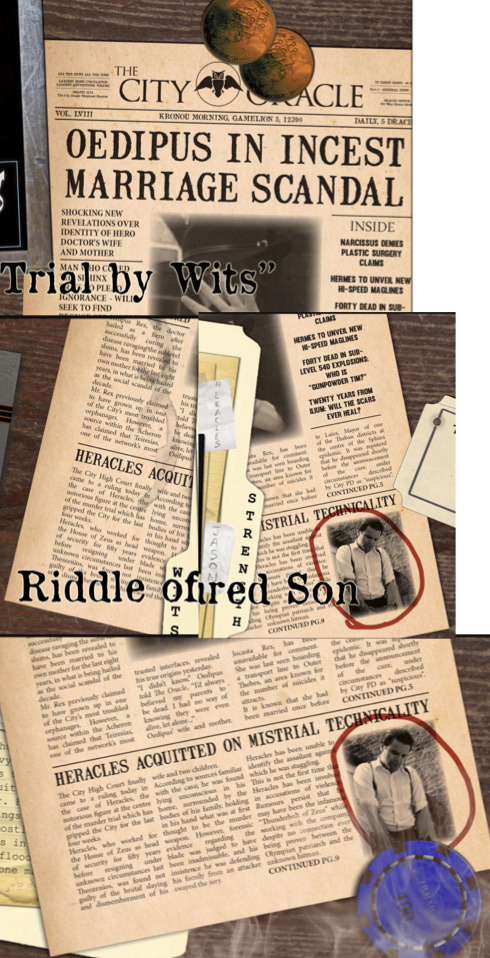
TRANSCRIPT BEGINS
ALL THE NEWS ALL THE TIME
LARGEST HOME CIRCULATION
LARGEST ADVERTISING VOLUME
DELPHI 2374
The City Oracle Telephone Number
THE CITY ORACLE
IN THREE PARTS - 46 1…
PART 1 - GENERAL NEWS…
ORACLE OFFICE
292 West Hector Stree[t]
VOL. LVIII KRONOU MORNING, GAMELION 5, 12390 DAILY, 5 DRACH[MA]
OEDIPUS IN INCEST MARRIAGE SCANDAL
SHOCKING NEW REVELATIONS OVER IDENTITY OF HERO DOCTOR'S WIFE AND MOTHER
MAN WHO CURED THE SPHINX TRIES TO PLEAD IGNORANCE - WILL SEEK TO FIND REFUGE OFF WORLD
(columns on right):
INSIDE
NARCISSUS DENIES PLASTIC SURGERY CLAIMS
HERMES TO UNVEIL NEW HI-SPEED MAGLINES
FORTY DEAD IN SUB-LEVEL 54D EXPLOSIONS: WHO IS “GUNPOWDER TIM?”
TWENTY YEARS FROM ILIUM: WILL THE SCARS EVER HEAL?
Oedipus Rex, the doctor hailed as a hero after successfully curing the disease ravaging the sublevel slums, has been revealed to have been married to his own mother for the last eight years, in what is being hailed as the social scandal of the decade.
Mr. Rex previously claimed to have grown up in one of the City's most troubled orphanages. However, a source within the Acheron has claimed that Teiresias, one of the network's most trusted interfaces, revealed his true origins yesterday.
“I didn’t know,” Oedipus told The Oracle, “I’d always believed my parents to be dead. I had no way of knowing they were even alive, let alone…”
Oedipus’ wife and mother, Jocasta Rex, has been unavailable for comment. She was last seen boarding a transport line to Outer Thebes, an area known for the number of suicides it attracts.
It is known she had been married once before to Laius, Mayor of one of the Thebian districts at the centre of the Sphinx epidemic. It was repoterd that he disappeared shortly before the announcement of the cure, under circumstances described by City PD as ‘suspicious’.
CONTINUED PG.5
HERACLES ACQUITTED ON MISTRIAL TECHNICALITY
The City High Court finally came to a ruling today in the case of Heracles, the notorious figure at the centre of the murder trial which has gripped the City for the last four weeks.
Heracles, who worked for the House of Zeus as head security for fifty years before resigning under unknown circumstances last Theozenios, was found not guilty of the brutal slaying and dismemberment of his wife and two children.
According to sources familiar with the case, he was found lying unconscious in his home, surrounded by the bodies of his family, holding in his hand what was at first thought to be the murder weapon. However, forensic evidence regarding the blade was judged to have been inadmissible, and his insistence he was defending his family from an attacker swayed the jury.
Heracles has been unable to identify the assailant against which he was struggling. This is not the first time Heracles has been involved in accusations of violence. Rumours persist that he may have been the infamous “Thunderbolt of Zeus” while working with the company, despite no connection ever being proven between the Olympian patriarch and the unknown hitman.
CONTINUED PG.9
TRANSCRIPT ENDS
Delphi and the oracle are referenced several times.
A drachma is a greek unit of currency, hence why I have guessed that as the unit of price for the newspaper.
Teiresias, the one referenced as revealing Oedipus’ parentage, is a blind prophet of Apollo from Thebes, known for clairvoyance and being transformed into a woman for several years. he is referenced as being one of the first brains volunteered into the acheron in the fiction, and holds and manages all the knowledge of the acheron.
Theoxenia seems to be a descriptor for greek mythology stories in which characters show benevolence and hospitality to strangers who turn out to be disguised deities capable of reward. These stories encourage people to treat anyone they meet as potential disguised divinity.
ONWARD!
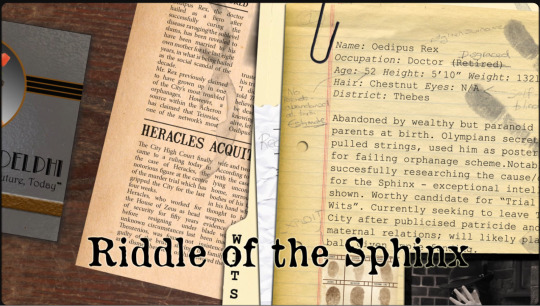
another oracle of delphi ad, the corner of the newspaper, and part of hades’ file on oedipus..
TRANSCRIPT BEGINS (pencil markings in orange)
Name: Oedipus Rex not given surname
Occupation: Doctor (Retired) Disgraced
Age: 52 No records- abandoned at birth. Estimate Height: 5’10” Weight: 132l[b]
Hair: Chestnut Eyes: N/A self-blind[ed]
District: Thebes
Abandoned by wealthy but paranoid parents at birth. Olympians secret[ly] pulled strings, used him as poster [child] for failing orphanage scheme. Notab[le] for successfully researching the cause/[…] for the Sphinx - exceptional intel[ligence] shown. Worthy candidate for "Trial [by] Wits". Currently seeking to leave T[he] City after publicised patricide and maternal relations; will likely pla[…] ball given ample funding. EXPLOIT
END TRANSCRIPT
the tab at the side reads WITS. as well as oedipus’ fingerprints, there is a dirty handprint in the top right of the document. the newspaper appears to be stained with rings of tea or coffee.
at first I thought the photo of oedipus featured in hades’ document was this one, but it doesn’t quite match. it’s a good photo anyway.

NEXT
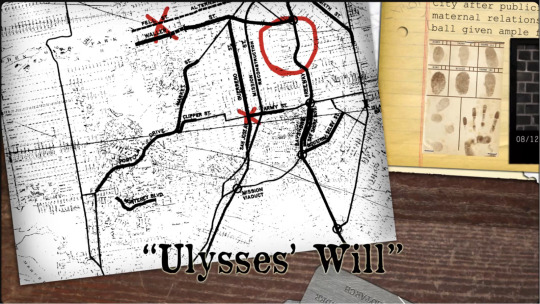
gunpowder tim’s dog tags from earlier are visible at the base of the photo again. A different part of Oedipus’ file is shown, showing a handprint and the start of a date on the photo of Oedipus, beginning 08/12. a map is shown too, with crosses through two locations and a circle around another. from what I can see the streets seem to mostly have fairly generic names.
sadly I have now reached image limit. when I have made the next post, I will link it here.
update I realised some of the stuff guessing cut off words and such that I did is pointless because the full documents for a bunch of them are in the goddamn cd book thing. and I kind of can’t be bothered to finish cause it feels like half the stuff I did was pointless. if you would be interested say so and maybe I will do more. but otherwise. nah
133 notes
·
View notes
Text
Jean-Marie Le Pen raconte Dominique Venner, « l’intellectuel samouraïque » | Institut Iliade
14 notes
·
View notes
Text
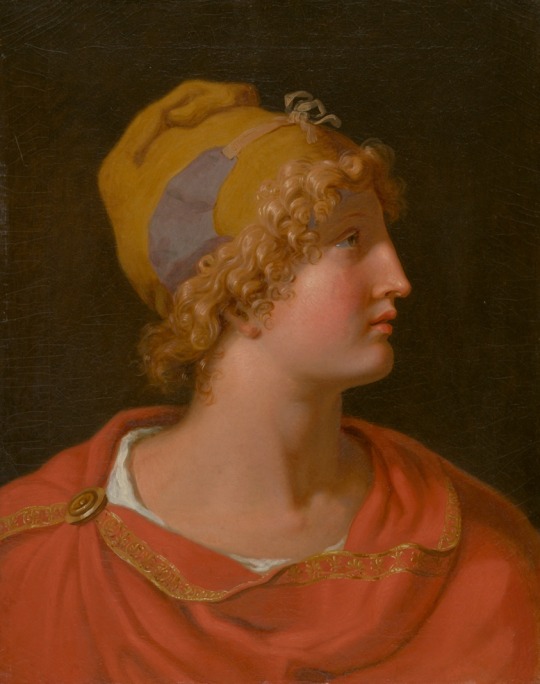
Paris
Artist: Johann Heinrich Wilhelm Tischbein (German, 1751–1829)
Date: 1785-1795
Medium: Oil on Canvas
Collection: Art Institute of Chicago
Paris, also known as Alexander, is a mythological figure in the story of the Trojan War. He appears in numerous Greek legends and works of Ancient Greek literature such as the Iliad. In myth, he is prince of Troy, son of King Priam and Queen Hecuba, and younger brother of Prince Hector. His elopement with Helen sparks the Trojan War, during which he fatally wounds Achilles.
#mythological painting#paris#greek mythology#johann heinrich wilhelm tischbein#german painter#18th century painting#trojan war#myth#greek#legend#literature#prince#troy
18 notes
·
View notes
Note
I just read a Wonder Woman comic that revolved around the concept of an honor-bound host-guest relationship, where one person pledged themselves to service to the other and that other was bound to protect them as long as they stayed. I assume the specific ritual was made up for the comic, but was there anything in that vein in Greek antiquity it may have been drawing from?
There absolutely is!
The institution of guest-friendship (ξενία/xenia) was a major part of Ancient Greek society as a structuring ethical principle, and it shows up all the time in classical literature. It's this idea of reciprocal obligation, respect, and care owed between a host and guest, even if they were originally strangers to one another. Guest-friendship falls under the domain of Zeus Xenios, who can punish those who violate it from either side, or bless who fulfill it.
The behavior of the suitors in the Odyssey is so egregious partly because it's a violation of xenia; by contrast the way Odysseus is treated by the Phaeacians, and the way he responds, is model host-guest behavior. We likewise see the power of xenia in book six of the Iliad, when Diomedes and Glaucus meet in battle, realize their fathers had a guest-friendship relationship, and so choose not to fight each other. And of course a lovely paradigmatic example of xenia is when Baucis and Philemon, alone of all the households disguised Zeus and Hermes visit in the Metamorphoses, invite the two strangers in to share what humble food they have and are blessed for it.
28 notes
·
View notes
Text
little-discussed classics major experience is either reading the entirety of the iliad/odyssey before you even dream of stepping foot in a post-secondary institution OR never reading the iliad/odyssey in one go but instead reading it in pieces according to whatever essays you have to write this semester until you graduate having fully read both of them. No in-between.
#i mean i'm sure there's an in-between but i've never met someone who wasn't one or the other#tagamemnon#classics#homer#iliad#the odyssey
25 notes
·
View notes
Text
DIAS Black Friday Sale
Once a year, the Dublin Institute for Advanced Studies (DIAS), offers a sale for Black Friday -- DIAS is one of the major publishers for Celtic Studies, many of the best studies of medieval Irish material have come through there.
Some books that I recommend, personally:
Fergus Kelly, A Guide to Early Irish Law (26.25 Euro, normally 35) (THE introduction to law in medieval Ireland)
"", Early Irish Farming (26.25 Euro, normally 35) (Everything you wanted to know about day to day life in medieval Ireland but were afraid to ask. Literally. Everything.)
Medieval Irish Prose
Fergus Kelly, Audacht Morainn (18.75 Euro, normally 25)
Are you planning on becoming a medieval Irish king? Do you want to know what you should do to involve the total destruction of the natural order? Then this is the text for you! Now with English translation!
In all seriousness, this text is used a LOT with regards to studies of ideal kingship in medieval Ireland.
Cecile O'Rahilly, The Táin from the Book of Leinster (26.25 Euro, usually 35)
I'll be real with you, lads: I hate Cú Chulainn. I hate him. I hate his smug, misogynistic face. His creepy multi-pupiled eyes. The shitty way he treats Emer. The way that his presence is like this black hole in the study of medieval Irish literature that means that the Ulster Cycle can get a prestigious yearly conference held in its honor while the other cycles are left with either crumbs or outright dismissal. I think the Táin is boring and episodic as a piece of lit and I've never found anything overly redeeming about it over any other piece of medieval Irish literature, especially since imo other pieces of literature do women (and homoeroticism) much better and get much less praise for it.
...that being said. It's important. It IS iconic, both as a piece of medieval Irish literature and, in general, to Irish literature. Its status as The Irish Iliad means that, if you want to study medieval Irish stuff...you have to read the Táin. And this is a version of the Táin that you might not have gotten, translated and edited by a master of Old Irish, with commentary.
"", Táin Bó Cúailnge: recension I (10 Euro, normally 35)
See above.
Early Irish History and Genealogy
T.F. O'Rahilly, Early Irish History and Genealogy (30 Euro, normally 40)
So. On the record, a lot of what he says here is absolutely not currently believed in the field. Just. No. BUT. There's a reason why I always recommend him anyway, and it's because if you're serious about doing a study of Irish Mythology, whatever we take that to mean...you will not be able to avoid this man. His ideas were very popular for decades and still often are to people who don't really focus on mythology. It's better to know where these ideas come from and to identify them than not, and O'Rahilly, in his defense, had an *excellent* knowledge of his sources. It's dense, it's difficult (rather like the author himself, from the accounts I've heard), but it's necessary if you really want to attack this.
Joan Radner, Fragmentary Annals of Ireland (22.50, normally 30)
There is so much weird shit in the Fragmentary Annals. So much.
Welsh
Patrick Sims Williams, Buchedd Beuno: The Middle Welsh Life of St Beuno (22.50 Euro, normally 30)
I know what you're thinking: "Why the FUCK are they recommending this book about a random Welsh saint? Answer: Because this is how I learned Middle Welsh. The introduction to Welsh at the front of the book + the VERY good index at the back is still one of the best ways to learn Middle Welsh. Also if anyone was watching the Green Knight film and going "Why is there a lady with her head chopped off?" this answers that question.
R. L. Thomson, Pwyll Pendeuic Dyuet: the first of the Four Branches of the Mabinogi, edited from the White Book of Rhydderch, with variants from the Red Book of Hergest (15 Euro, normally 20)
Once you've gotten enough of a hang of Middle Welsh to know the basics, it's time to dive into the classics, and what better way to do it than with the Mabinogi, starting at the very beginning, with the First Branch? Personally, I dislike a lot of Thomson's orthographic decisions, but, hey, it's the First Branch, and that's Middle Welsh orthography for you.
Ian Hughes, Math uab Mathonwy (22.50 Euro, normally 30)
The Fourth Branch, my beloved. Incest, rape, bestiality (well...pseudo bestiality, really), creating a new life while not being willing to deal with the consequences of it...it truly has it all. Not for the faint of heart, but absolutely worth the read if you can stomach it because imo it handles its themes very well and it's incredibly haunting.
And a lot more -- go in, shop around, see what's available. Even with the older books, they're often things that we're still referencing in some way into the present.
49 notes
·
View notes
Text


Current read after finally finishing the Iliad and my reading journal (I decided to sit down and reflect on some books I have on my wishlist, why they are there and why I feel interested in them at the moment, it was actually quite fun and a nice form of reflection, I might end up doing it again every once in a while as I add new books to my wishlist).
18|01|2025
Some updates after a few days of being too tired to post my daily entries. I am growing more and more tired which isn't ideal, and tomorrow I will have to break my personal rule of not studying on Sundays, which is a necessity I am not happy about. I am studying for my history of political and social institutions exam and I don't feel confident at all. I will manage to do the bare minimum for it so I am partially hoping in being lucky by getting the right questions on the day of the exam. Moreover the exam is going to be very early and not at my uni, but in a whole different building I don't know. Which adds to me being very anxious, because I cannot even count on the comfort of knowing my surroundings. My levels of anxiety at the moment are over the roof, I've had a continuous stomach ache for three days and overall I feel super tense. I really cannot wait for it to be over so I can rest. The one positive thing I am looking forward to next week is getting my new tattoos! I will give up on a morning of studying for it, but when I got my appointment exam dates weren't out yet, and since tomorrow I'll be studying I guess Monday morning will be my half day of rest. I am trying to stay as positive as possible, thinking I will get the right questions and that everything will be alright, but ngl it's not so easy for me rn.
📖: Elektra by Jennifer Saints
#i am so tired i hate this so much#i have that stupid feeling of 'i want to go home' but who is going to tell my brain that i am home?????#uuuuuugh why is it like this every single fucking exam season ugh#i am so mentally exhausted#studyblr#studyinspo#uniblr#university#journal#studying#productivity#journaling#knife gang#mine#the---hermit
27 notes
·
View notes
Text
my myth teacher keeps giving us these questions asking us who we think is right in situations where both parties are clearly in the wrong (most egregious example was from the iliad about achilles and agamemnon arguing over who should be able to keep a sex slave???) which makes me think this must be one of the ways educational institutions groom children into becoming voters
15 notes
·
View notes
Note
Was the Myth of Ganymede invented to justify pederasty?
No matter what Plato tries to claim in the Laws 636c about how the Cretans definitely invented it exactly because of that reason... That's just not something we can know haha.
Like, trying to claim we know the reason any given myth at all was "invented" is kind of ridiculous in general!
When it comes to the Ganymede myth, our oldest surviving version is in the Iliad. Which, as any academic will tell you, doesn't have any overt sexual dimension. They usually like to assert that this means that in the Iliad's time of formation, Ganymede's abduction didn't have any sexual/pederastic dimension yet. (In the Iliad, it isn't even Zeus himself/alone to takes Ganymede, but "all the gods".)
Which might very well be true! In which case a sexual/pederastic dimension was added sometime maybe after somewhere 700 BC.
However, I'd also like to point out that the Iliad likes to angle quite a lot of its myths in various ways, and doesn't necessarily tell us everything (it especially likes to strip out as much of the fantastic as it can, even with still having the gods as characters and actors). So, I don't think that necessarily means we could categorically say there might not have been any sexual (and thus pederastic) angle to the Ganymede myth at this point.
The Homeric Hymn to Aphrodite (probably at least Archaic in date) jumps to having Zeus be the agent who takes Ganymede (but again, all the gods are delighting in his presence!). I've still read academics wanting to say there is yet no sexual dimension here. Perhaps there isn't. But I'm not sure I (personal, unprofessional opinion as it is lol) would agree, considering the context Ganymede and Zeus is being brought up, both in terms of the hymn itself dealing with a sexual relationship, and the company it keeps (Eos-Tithonos).
I think at best one might be able to say that if Ganymede's myth didn't have a sexual dimension between him and Zeus "from the start" (whenever that would be, whether or not formal pederasty as such or something similar was a thing yet), then the sexual dimension might have been added in response to (changing) social developments, that is, pederasty.
But, we don't know. We can't know. And either way I don't think it was in any way invented to justify such a thing. At most, it could be reflecting it.
(Especially since formal paiderasteia is something very specific and the myth of Ganymede probably/definitely is older than said formal institution, sexual dimensions or no, depending on how old one would consider the formal institution to be.)
14 notes
·
View notes
Text
The Iliad and the Odyssey and their Ancient Origins

By JW1805 at en.wikipedia, Public Domain, https://commons.wikimedia.org/w/index.php?curid=2171360
Homer lived in about the 8th century BCE and was an Ancient Greek poet, widely regarded as one of the best poets in the world, Plato saying he 'taught Greece', Dante having Virgil say he is the 'Poet sovereign', Alexander Pope referring to him as the 'greatest of poets'. There were many other works attributed to Homer in antiquity, including the Contest of Homer and Hesiod, perhaps expanding the line from Hesiod's Works and Days in which he claimed to have won a poetry contest. Though, with various references in the poem, it was dated to the second century CE.

By Francesco Hayez - The Yorck Project (2002) 10.000 Meisterwerke der Malerei (DVD-ROM), distributed by DIRECTMEDIA Publishing GmbH. ISBN: 3936122202., Public Domain, https://commons.wikimedia.org/w/index.php?curid=152601
It is thought that the blind bard Demodocus from the Odyssey was meant to represent Homer, leading to the oft repeated description that Homer was blind. He was said to have been the son of the river god Meles and the nymph Critheis, that he wandered, and that he died after failing to solve a riddle. There were many biographies of Homer written in the ancient world, all of which were based on the traditions passed down about him rather than based on studying writings of those who might have known him.

By Lawrence Alma-Tadema - fAFfW9CzajZAaA at Google Cultural Institute maximum zoom level, Public Domain, https://commons.wikimedia.org/w/index.php?curid=21886584
Studying Homer's writing is one of the oldest forms of scholarship, going back to Ancient Greece and Rome. There are writings by Xenophanes of Colophon, a Greek theologian, who claimed that Homer's treatment of the gods made him 'immoral'. Theagenes of Rhegium countered that the poems are meant to be allegories, only symbolic and not meant to be taken as literal representations of the gods. There were also commentaries to help make Homer's Ancient Greek understandable to those who spoke classical Greek. His works were taken as to support the Stoics and containing hidden wisdom, and that the poems purpose was to educate. Eustathius of Thessalonica produced nearly 6,000 pages (in the 21st century printed version) of commentary on the Iliad and the Odyssey in the 12th century CE.

By Pinpin (talk · contribs) - Inspiré de la carte "ACHAEANS and TROJANS" du site de Carlos Parada, CC BY-SA 3.0, https://commons.wikimedia.org/w/index.php?curid=2830268
Dating the Trojan War and the composition of the Iliad and the Odyssey as well as their historical factually is complicated. The ancient Greeks give us a date of 1184 BCE as the date of the sack of Troy, though there are wide-spread doubts that Troy existed as Homer wrote about them. Homer's poems also contain combinations of Bronze Age elements (bronze weapons, large shields, and a boar's tusk helmet) along with Iron Age elements (cremation, smaller shields, and many aspects of the civilization). These may be artifacts of anachronism that crept in because of Poetic license or lack of primary sources, or they may be elements that show the epics are works of pure historical fiction. No locations have been found, to date, that match Homer's description of Troy. Additionally, with the translation of Linear B, we now know that Bronze age Greek civilization was more closely related to that of the ancient Near East.

By CherryX per Wikimedia Commons, CC BY-SA 3.0, https://commons.wikimedia.org/w/index.php?curid=21675688
Whether the Trojan War happened as described in the Iliad and the Odyssey was debated even in antiquity. Thucydides, a historian who lived about 460-400 BCE, was of the opinion that it was a historical event but was exaggerated by Homer, that there were not 1,186 ships sent to Troy. Later, opinion swung that the Trojans won the war and the epics were a way of the Greeks hiding that loss from the historical record, as written by Dio Chrysostom in about 100 CE. Gradually, it was generally believed that the Trojan War was fully fictional until 1870, when Heinrich Schliemann excavated Hisarlik, Çanakkale, which he believed to be the historical Troy, leading to the interpretation that the that there was a Greek campaign against Troy but that the poems aren't a faithful record of the events. Since the 1990s, efforts have been made to understand the conflict as it appeared in writing of the countries around the area, such as the Hittites.

By Unknown author - http://www.lgpn.ox.ac.uk/image_archive/mss/mss2.html, Public Domain, https://commons.wikimedia.org/w/index.php?curid=4297434
The Iliad and the Odyssey are both written in a 'literary language', or formal language, rather than the 'everyday language' that people commonly spoke. They were mostly written in Ionic Greek with an level of importance of the number of syllables per line, which was part of the reason for many of the epithets (such as 'rosy-fingered Dawn' and 'owl-eyed Athena') as well as the so-named 'Homeric formulae (for example: 'and then answered [him/her], Agamemnon, king of men' or 'when the early-born rose-fingered Dawn came to light') which influenced later Greek and Roman poetry. These 'oddities' are sometimes taken as evidence that the epics were orally transmitted before they were written down. Other 'fingerprints' of oral telling include 'ring composition' (introducing elements or ideas in one order then reversing them, which might be a mnemonic device), short sentences with limited use of conjunctions, and using 'type scenes' for things that happen often in the poem.

By User:Bibi Saint-Pol - Own work (Original text: Own work (using Wikisource for text)), Public Domain, https://commons.wikimedia.org/w/index.php?curid=1904767
The Iliad is 15,693 lines long, divided into 24 books (one for each letter of the Greek alphabet). It covers the ten-year long siege of Troy (Ilium) by the Mycenaean Greeks, though it focuses primarily on the final weeks of that campaign. It also details the machinations of the Olympian gods in provoking and prolonging the war.

By Michel Martin Drolling - Transferred from en.wikipedia to Commons by User:Twice25 using CommonsHelper., Public Domain, https://commons.wikimedia.org/w/index.php?curid=4297275
The first four books give the exposition for the story, beginning near the end of the war, then explaining what happened that caused the war, from the competition between the goddesses for the golden apple caused by the spiting of Eris. through to Hera convincing Zeus that only the destruction of Troy is acceptable and Athena nudging the Trojan archer Pandarus to shoot Menelaus, breaking the truce. The next three books focus on duels between the Greeks and Trojans. Books 8-15 talk about the Trojans winning against the Greeks and the machinations among the gods to allow this to happen. Books 16-18 focus on Patroclus' sacrifice and books 19-24 focus on Achilles' grief and rage at the death of his companion. Achilles' rage is the ring composition that encompasses the entire poem as it begins 'Wrath of Achilles' as the opening words of the epic.

By File:Odyssey_manuscript.jpg photoshoped by Odysses - File:Odyssey_manuscript.jpg, Public Domain, https://commons.wikimedia.org/w/index.php?curid=46651771
The Odyssey is 12,109 lines long, also divided into 24 books. It focuses on Odysseus' return home to Ithica and his reunion with his family, which can be contrasted with Agamemnon's return home to Clytemnestra, who kills Agamemnon with the help of her lover Aegistrus, or Achilles' inability to return home at all despite his fame. The second main theme is that of hospitality to strangers, as exemplified by the Phaeacian court and by Odysseus' shepherd who takes him in when he's disguised.

By VladoubidoOo - Own work, CC BY-SA 3.0, https://commons.wikimedia.org/w/index.php?curid=30558926
The Odyssey begins with Odysseus being unable to return home to Ithica because he angered Poseidon, so he's staying with Calypso, or a captive of Calypso. There is also a focus on Odysseus' family, Penelope and Telemachus, and the suitors camping in the palace, campaigning for Penelope's hand in another type of siege, with Telemachus setting out for Sparta to find information on his father. The first four books set up the story with the gods pushing the humans into place to begin the journey. Books 5-8 deal with Odysseus leaving Calypso's island of Ogygia and and he managed to make it to Scherie despite Poseidon's wrath at him because of the help of goddesses. In books 9-12, Odysseus recounts his adventures to the Phaeacians including episodes with the lotus fruit that cause amnesia, the island of the Cylcopes, the winds given by Aeolus and the resulting storm, the Sirens, and the hunting of the sacred cattle, which is how Odysseus ended up on Calypso's island. In books 13-20, Odysseus is able to get home with the Phaeacians' help, though they drop him off while he's asleep and at a hidden cove so Athena needs to let him know where he is. She has him hide the treasure the Phaeacians left for him and disguise himself as an old man so he can reconnoiter things around his home. Telemachus returned home from Sparta, avoiding an ambush set up by the suitors as he does so. He meets up with his father and they plan how to defeat the suitors. In books 21-24, they carry out the plan, beginning with challenging the suitors to an archery contest for Penelope's hand through to the massacre of the suitors and the execution of the maids who were unfaithful to the household through having sex with the suitors.
You can read the Iliad here. You can listen to the Iliad here. You can listen to OSP's summary here.
You can read the Odyssey here. You can listen to the Odyssey here. You can listen to OSP's summary here.
3 notes
·
View notes
